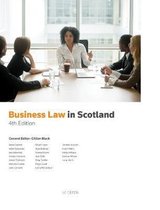Lecture 8 – The Members: Meetings and Resolutions
Podcast 1
Recommended Reading
Grier N, Company Law (5th edn, W Green 2020) Chapter 13
Black G (ed) Business Law in Scotland (4th edn, W Green 2019) Chapter 16
Format of this lecture
In this lecture we will consider:
▪ Who the members of the company are
▪ Annual general meetings and extraordinary general meetings and their proceedings
▪ Ordinary resolutions and special resolutions, and for private companies, written resolutions
The Members of the Company
▪ A member of a company is illegal or an actual person who's regarded as a company's owner.
▪ Members can be natural persons or legal persons such as other companies, and can also
include Scottish partnerships as well as they have separate legal personality.
▪ In companies limited by shares, a party who has acquired shares of the company is a member
of the company.
▪ In companies limited by guarantee, the owners are known as the members of the company.
▪ The first members are those who subscribe their names to the memorandum of association.
▪ Others become members by having their name entered on the register of members – s.112
CA 2006
▪ S.113 – keeping a register - A company must keep a register of names of the members in
accordance with s.133 that contains the basic details of the member of the company, the
number of shares that the member holds if it is a company limited by shares.
▪ S.116(2) - requires that any person who is looking for access to this list of members can make
a request to the company to do so. If they do so, they must have a legitimate or appropriate
purpose for requesting such information. It's to protect members interests principally and
protect them from any harassment or misleading activities. So an example of where proper
purpose would be acceptable is for a credit reference agency to check compliance with anti-
money laundering regulations or where trustees in sequestration or liquidator's request to
access the relevant information in relation to a member of a company, and in particular the
amount of shareholding or if a particular member or creditor needs to do diligence against
payments from dividends, for example.
, General Meetings – the AGM
▪ Does a company have to have any general meetings?
Yes in a public company – a private company can use written resolutions and does not need
to hold an AGM - CA 2006.
The first is to provide a basis for accountability and the second is to provide a basis for
approval of decisions. Provides the members to hear that which is being proposed on behalf
of the company and to take action in relation to it. So it holds directors as managers of the
company to account, and it also enables for some form of approval by the members of the
decisions which are being proposed by the managers.
▪ Annual General Meetings (AGM) and Extraordinary General Meetings (EGM)
▪ Annual general meetings: mandatory for public companies, but not for private - s.336 CA 2006
▪ What is the usual business of an AGM?
There are a variety of matters that can be discussed at an AGM, including approval of
accounts, approval of directors, reports, and if a dividend is going to be declared and paid
reappointment of the auditors of the company and their remuneration, and where applicable,
the appointment of directors as well.
▪ s.303 - For private companies, if the directors choose not to convene an AGM, then the
members who may hold 5% of the voting rights can request a meeting and a particular item
for discussion or a resolution reported at a meeting. An AGM for a private company requires
14 days notice if that's accepted, then the meeting must be called within 21 days of the
members requesting the meeting, and there must be a notice regarding the meeting together
with any proposed resolution under s.304(2) and the meeting must then take place within 28
days.
▪ Getting things on to the AGM agenda – s.338 and 338A CA 2006
This section applies where members wish to bring forward a resolution to a public company
meeting. The company must get notice of the intention to bring forward this resolution,
provided it is not a vexatious resolution, a defamatory resolution or an ineffective one.
Extraordinary General Meetings
▪ These take place when there is business to transact - this basically means that and there must
be a justified reason for calling an extraordinary general meeting in the first place.
▪ The directors must convene one when:
▪ the holders of 5% or more of the paid up capital requisition one –s.303 CA 2006;
▪ the court orders one –s.306 CA 2006
Re Sticky Fingers Restaurant Ltd [1992] BCLC 84
In this case, there were two company directors, one with a majority shareholding who wanted
to remove the other director for various reasons. The company articles said that the meetings
had to have two directors present to be called. The other director wouldn't attend the meeting





